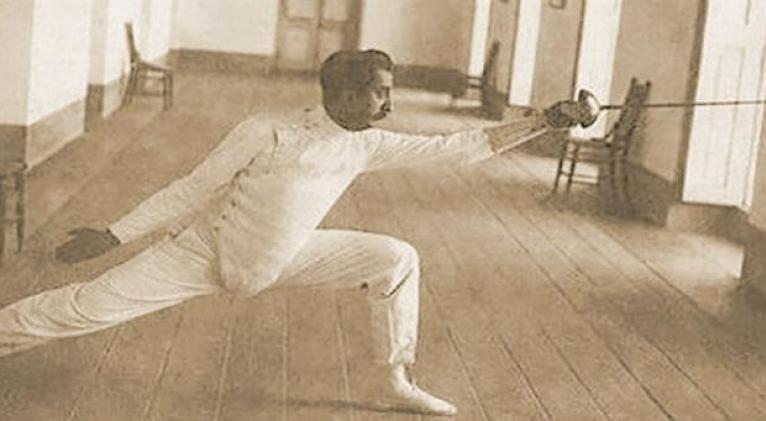Fonst Holding a Sword
especiales

A certain sadness was evident in what Ramón Fonst Segundo said during the interview that appeared in Bohemia months before his death, which occurred in his Havana on September 10, 1959. “I challenged more than a hundred opponents to a duel and I was only able to fight once”, expressed the first Olympic champion of Latin America, a victorious swordsman undefeated in Paris 1900, born in our capital on August 31, 1883. In the French capital he also achieved the subtitle among professionals. In San Luis 1904 he added three more gold medals.
To questions about the origin of so many disputes: “I was always right. Without reason I wouldn't be able to fight anyone. My victories aroused envy in some of my fellow men, and they spoke ill of me, they wanted to harm me. I responded with a challenge.”
He sent the seconds to personalities from France, England, Spain, the United States, Belgium and Cuba. It happened frequently and it was in fruitless because "... my detractors responded, but retracted, and gave me the most complete satisfaction..."
Upon being selected to perform at the San Luis Olympic Games (1904), “some said and published concepts that I did not like. They had not been able to join the team and they censored me unfairly. Before leaving, I challenged those resentful in a public letter and declared that upon my return I would fight each of them. I won several awards in the contest and I returned ready to do what I promised.” It just happened what I feared. They all split. They sent him excuses along with congratulations for the winnings. “And I was left again with the sword in my hand.”
In 1935, during the Central American Games in El Salvador, a journalist offended him through an article published in a newspaper of that country. He went out looking for him. He couldn't find him. “But one morning, I learned that this Fray Nano was in Cuba, in the bay, aboard the ship Orizaba, and I sent him my seconds.” He also failed to get even: the reporter never showed up.
Worse happened with the French fencer Adolfo Kerchoffer. “We had differences in France; he arrives in Havana. I took advantage of the opportunity to demand explanations from him or for him to accompany me to the field of honor.” The challenged apologized in a document signed by the ace's representative. But a few days later, Kerchoffer returned to defame the fencer in several places. “I found out and sent the challenge again with my friends. They found him in the lobby of the Louvre Hotel and, as soon as they asked him about it, the man decided to take the stairs. And he vanished.”
Maestro Rivas, his countryman, said yes to resolve difficulties. They begin the meeting. Attacks, parrings. Suddenly, the judges intervene because they consider it appropriate to call off the duel. There’s no winner or loser or any wound. Fonst noted about that fight: “I was happy after all. He was a good person belonging to a preferably gentlemanly era, he was born in 1883. A strong man, with long arms like almond branches, his figure does not resemble another in all its dimensions. Although, isn't it a tragedy that out of a hundred challenges only one person accepted and the grief turned into frustration?
When reading his service record in the matches, one understands that he was a fencing genius; for many, he is the best of all times. I don't like to absolutize: he is among the greats and he is one of the immortals of sports.
Translated by Amilkal Labañino / CubaSí Translation Staff














Add new comment